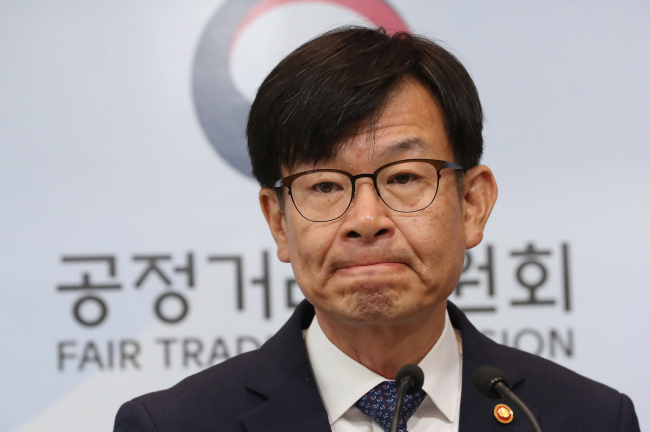The nation’s antitrust watchdog said on Sunday that it was proposing legislation to overhaul the nation’s fair trade laws and strengthen regulations against unfair business practices. It is now inviting feedback from the public before submitting the proposal to the National Assembly.
If the laws are revised as proposed, the overhaul will be the first major change to Korea’s fair trade laws in 38 years.
Foremost among the changes is the revocation of the Fair Trade Commission’s exclusive right to investigate cartel activity, which would also extend to prosecutors under the new regulations. Cartel activity means suppressing fair competition or depriving other companies of opportunities to enter a market -- for example, by fixing prices, rigging bids, dividing markets and unfairly limiting supplies.
 |
FTC Chairman Kim Sang-jo |
Under the changes, prosecutors could charge companies with cartel activity directly, without involving the FTC. Victims of other unfair business practices would be able to file complaints directly with the court and would not have to deal with the antitrust watchdog.
Furthermore, courts would be able to order companies found guilty of violating antitrust laws to submit documents that could be used to determine their liability. Currently, violators can cite confidentiality as a reason to refuse, and this makes it difficult for victims to obtain appropriate damages.
The overhaul would also curb the power of influential families to exercise control over conglomerates’ affiliates through corporate foundations.
Currently, most conglomerates, including Samsung, Hyundai Motor, SK, Lotte and Hanjin, have corporate foundations that hold stakes in the groups’ affiliates.
Corporate foundations are usually established for the purpose of contributing to society through scholarships or research funds. But some conglomerate-owning families are reported to have used the foundations to circumvent inheritance and gift taxes or to strengthen the family’s power.
The FTC said it would prohibit corporate foundations from exercising voting rights over their affiliates by limiting management rights in matters such as the appointment of executives, changing articles or mergers and acquisitions. But if the affiliates were listed, foundations would be able to exercise voting rights within a 15 percent limit.
The changes reflect the input of academics, politicians and businesses and involved many debates. The FTC said it would listen to feedback from the public during this preannouncement phase, and would submit the revised bills during the regular session of the National Assembly.
By Shin Ji-hye (
shinjh@heraldcorp.com)







![[From the Scene] At this Starbucks, you need ID: Franchise opens store with view of North Korea](http://res.heraldm.com/phpwas/restmb_idxmake.php?idx=644&simg=/content/image/2024/11/29/20241129050068_0.jpg)
